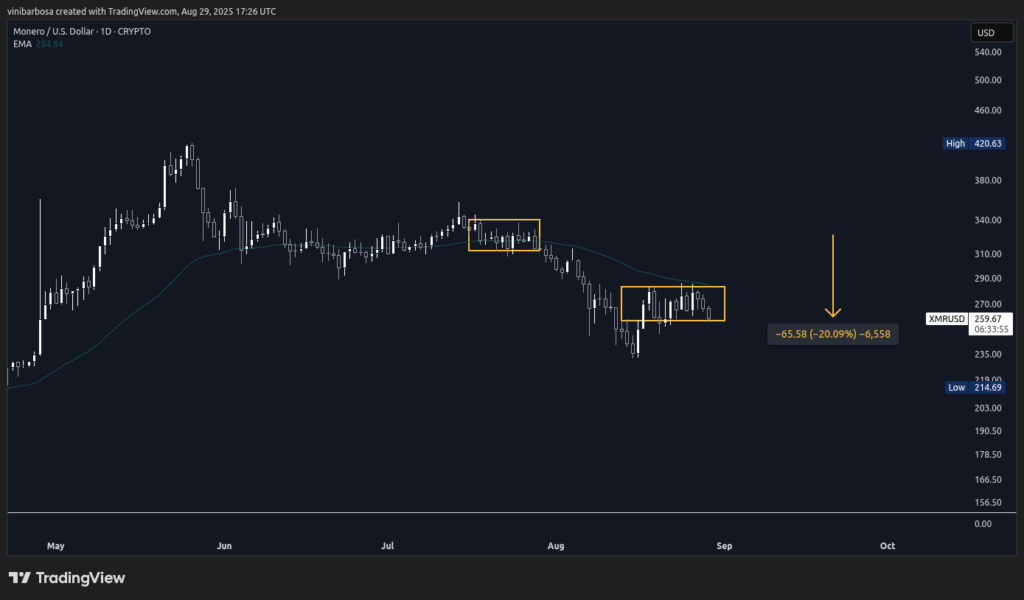- Monero developers push the Publish or Perish proposal to penalize delayed block broadcasts and weaken selfish mining attacks.
- A hard fork version with Reward Splitting would ensure honest miners still get rewards, cutting Qubic Pool’s dominance.
- XMR price has fallen 20% since July, but record searches for privacy coins suggest strong underlying interest.
Monero has found itself in the middle of a messy battle with selfish mining, and the culprit is Qubic Pool, controlled by Sergey Ivancheglo (a.k.a. Come-from-Beyond). With Qubic holding roughly 33% of the network hashrate, developers say honest miners are being undercut and trust in the system is shaking. To fight back, the Monero Research Lab is leaning on a proposal called Publish or Perish, which aims to strip selfish mining of its profitability and stabilize the network.
What Exactly Is Publish or Perish?
The proposal, put forward by tevador, comes in two flavors: a soft fork and a hard fork. The soft-fork version introduces the concept of “late block” penalties — miners who delay broadcasting their blocks get punished. This directly tackles the tactic of hiding blocks and later releasing them in bulk to force chain reorganizations. According to tevador, this would make smaller-scale attacks from miners with less than 51% hashrate much harder to pull off, though not impossible. Qubic, for instance, has already pulled off deep six- and nine-block reorgs during August 2025.
The hard-fork expansion layers on Reward Splitting, which ensures orphaned but valid blocks from honest miners still get a cut of rewards. This fundamentally changes how payouts work, removing the selfish miner’s ability to hog the entire block reward unless they’re able to outpace the network by 20+ blocks — an extremely costly move.
Community Weighs Options
In an open meeting on August 29, Monero Research Lab developers debated the paths forward. While many backed tevador’s proposals, some suggested more radical changes, like turning Monero into a hybrid chain with proof-of-stake elements. That idea drew criticism — developer ACK-J noted that Monero’s early distribution was already skewed in favor of early adopters, making a PoS system “insane” in his view. For now, most support staying with proof-of-work while hardening the system against selfish mining.
Dan Dadybayo, Research & Strategy Lead at Unstoppable Wallet, summed it up bluntly: “Monero’s resilience relies not just on privacy, but on a secure and fair mining process. With one pool running a third of the hashrate, that fairness is under threat. Publish or Perish and Reward Splitting are steps in the right direction — they make selfish mining less profitable while keeping honest miners afloat.”
XMR Price Feeling the Pressure
The market hasn’t ignored the drama. XMR is trading below $260 after losing around 20% since July, slipping under its 50-day EMA and stuck in a short-term downtrend. The timing is painful, especially as Google searches for “privacy coins” have hit record highs, showing growing interest even while price action falters.

If developers succeed in pushing through these defenses, sentiment could swing back, giving XMR the strength to recover. But if the attacks continue unchecked, Monero risks not just weaker prices but a dent in its reputation as the go-to privacy coin. For now, all eyes are on whether Publish or Perish gets formalized — and whether the network can weather this storm.
The outlook may turn favorable for Monero, with Google searches for “privacy coins” recently climbing to an all-time high, as noted by Coinspeaker.














